
Reports were circling Hollywood on Thursday evening (November 20) that Paramount, Netflix and Comcast have officially submitted first-round bids to acquire all or part of Warner Bros Discovery (WBD).
Screen reached out to the four companies and each one either declined to comment or had not responded by the close of the deadline for bids on Thursday. It was unclear whether other entities have entered the fray.
The development came after reports surfaced earlier in the day that Netflix had reached out to WBD to say that were it to prevail in the auction, it would honour existing contractual agreements with filmmakers to release Warner Bros films theatrically.
The Netflix reports added spice to a bidding process that sources say WBD CEO David Zaslav hopes will trigger an auction that can be completed by the end of the year. This comes after Zaslav previously said that he will split the company into streaming & studios and linear network components by mid-2026.
So what does each suitor bring to the table?
Netflix
The notion that Netflix would orchestrate theatrical releases flies in the face of the streamer’s long-held distribution strategy of broadly eschewing theatrical in favour of bringing films to its subscribers first on the service. However, given that Netflix’s proposal, first reported by Bloomberg, gives no specific undertaking about future films, it is not so outlandish.
Yes, Netflix co-CEO Ted Sarandos has said on numerous earnings calls that the streamer is a builder not a buyer and does not engage in conventional theatrical distribution. Leadership prefers to use limited theatrical releases to qualify films for awards consideration or occasionally accommodate outlier scenarios like KPop Demon Hunters, Glass Onion: A Knives Out Mystery, or next year’s Narnia.
And yet while Netflix’s 300m-plus global subscriber count and a churn rate of around 2% are the envy of Hollywood and the streaming community, the idea of a theatrical distribution pivot makes sense. All media companies have their eyes on streaming growth and even a service like Netflix would welcome the world-class IP owned by WBD to attract and retain more subscribers.
A deal with Zaslav promises a mouth-watering stable comprising the re-energised DC Studios pipeline, franchises like Harry Potter, The Lord Of The Rings, It, Final Destination, and MonsterVerse properties like Godzilla and King Kong with Legendary Entertainment, as well as partnerships on box office smashes like Minecraft and Barbie.
There is also the matter of regulatory scrutiny. A combined Netflix and HBO Max, which currently draws 128m subscribers per WBD’s Q3 earnings earlier this month and arrives in the UK, Germany and Italy in early 2026, may catch the eye of the Federal Communications Commission (FCC) chairman Brendan Carr, not to mention international regulators. So far this year Carr has appeared to be in lock-step with US president Donald Trump.
Comcast
Comcast is also in the running. Like Netflix, it has been reported that the NBCUniversal owner only wants the studio and streaming businesses, thereby avoiding potential regulatory scrutiny if it attempted to expand its cable business by acquiring WBD’s networks. The media giant is spinning off Versant, which houses most of its legacy networks, by the end of the year.
A combined studio empire with Universal would create the biggest studio entity in Hollywood, an IP behemoth that positions the acquired properties alongside Universal’s stable of heavyweights like the Jurassic Park and Fast & Furious series, and NBCU-owned DreamWorks Animation’s Despicable Me/Minions and Shrek properties. With this in mind, and acquisition would also enhance NBCU’s theme parks business.
Observers see the logic in Comcast CEO Brian Roberts using HBO Max to boost his streaming business, where Peacock is a minnow on approximately 41m subscribers. However Trump is not a fan of Roberts and can make life difficult for media owners as he has shown with a string of lawsuits and hectoring remarks.
Paramount
By contrast, Trump is on good terms with Paramount CEO David Ellison and his father Larry Ellison, the Oracle co-founder and one of the richest people on the planet who partly bankrolled his son’s acquisition of Paramount. New Paramount sweetened the relationship when it paid Trump $16m to settle a lawsuit brought by the president over an edited Kamala Harris interview that aired last year on CBS’s 60 Minutes. Ellison The Younger is believed to be the only Hollywood figure to attend a White House dinner this week for Saudi Crown Prince Mohammed bin Salman.
Paramount is understood to be pursuing all of WBD. David Ellison and his team have been busy forging creative partnerships since the $8.4bn Paramount-Skydance merger closed over the summer and the Warner Bros library would be a gold mine for a well-capitalised company that plans to release at least 15 features a year. The FCC’s Carr has said he does not think a Paramount-WBD deal would require a review.
WBD has reportedly rebuffed three bids from Ellison. This week Paramount denied a report that it was launching a joint bid with Saudi and other Middle Eastern sovereign wealth funds to acquire WBD.
There is no guarantee that a bid will be accepted and Zaslav may end up taking his chances and splitting the companies in 2026.
What is certain is Hollywood creatives do not approve of any process that removes another studio buyer from the landscape after Disney completed a $71bn acquisition in 2019 for most of the entertainment assets of 21st Century Fox.

























No comments yet